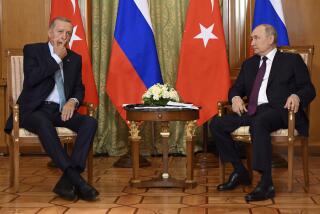Soviets Break Commitment for Second Year to Buy U.S. Wheat at Subsidized Prices
- Share via
WASHINGTON — Spurning a controversial Reagan Administration offer of 4 million tons of wheat at subsidized prices, the Soviet Union broke its commitment to buy at least that much wheat annually for the second straight year on Tuesday.
The subsidy offer was announced Aug. 1 at the instigation of GOP farm state politicians over State Department objections. The failure has left wheat farmers without anticipated Soviet sales at a time of continuing agricultural recession and may also have left congressional Republicans with fewer political defenses.
At the same time, the Soviets have been busily buying subsidized wheat and other grains in Europe and elsewhere, at prices well below the U.S. offer of $88 to $90 per metric ton.
The subsidies that President Reagan announced originally amounted to $13 a ton under U.S. market prices and were then cut even further to $15 a ton below the market. However, the global oversupply of wheat is such that the world market price is now hovering near $75 a ton.
Senate Majority Leader Bob Dole (R-Kan.), the prime mover behind the subsidy offer, blamed the failure on the monthlong crisis in U.S.-Soviet relations that began with the Soviet arrest of newsman Nicholas Daniloff. State Department officials tended to agree, but Agriculture Department and private sector analysts saw basic economic reasons as well.
Global Overcapacity
The persistent inability of American farmers to sell wheat to a perennially grain-poor Soviet Union underlines the huge global overcapacity for wheat production that has priced America out of many markets.
“What it says about the Soviets is that they have chosen to use the grain agreement as an option for them to exercise when it suits them, while the agreement they signed is a firm commitment,” said Daniel G. Amstutz, undersecretary of agriculture for international affairs and commodity programs. “Here we gave them exactly what they asked for (in the subsidy offer), and I’m disappointed that they didn’t fulfill it.”
The offer had been vigorously opposed by Secretary of State George P. Shultz, who argued that selling subsidized wheat to the Soviets was a bad way to deal with the Kremlin and a worse way to deal with trading partners whom the United States hoped to persuade to abandon agricultural trading subsidies. Some of the biggest complaints over the offer came from Australia, which has emerged as the largest late-summer supplier of low-cost wheat to the Soviets.
Under the five-year grain supply agreement signed with the Soviets in 1983, the Soviet Union undertook to buy at least 4 million metric tons of wheat and a similar minimum amount of corn, totaling 9 million tons of grain in each fiscal year. They met their purchase quotas the first year and have fulfilled their corn purchase agreements for the last two years, but they were 1.2 million tons short on wheat in fiscal 1985 and were deficient by virtually the full 4-million-ton wheat quota in this fiscal year, which ended at midnight Tuesday.
‘Not a Dependable Buyer’
“The Soviet track record indicates that they are not a dependable buyer, while we are a dependable source of supply. We need to rethink agreements with the Soviets,” said Carl Schwensen, executive vice president of the National Assn. of Wheat Growers.
Schwensen conceded, however, that the larger problem of global oversupply can only be addressed on a worldwide level. Last month, the United States won grudging agreement from its trading partners that the issue of agricultural subsidies must be negotiated in the framework of the General Agreement on Trade and Tariffs, but those negotiations probably will take years to reach any conclusion.
Wheat-growing interest groups and analysts stressed that foreign competitors have been very aggressive at pushing wheat into the glutted world market, sweetening sales with huge subsidies. According to World Perspectives, a private group that monitors grain markets worldwide, the Soviets last weekend closed a deal to buy 1.1 million metric tons of white soft wheat from France at $77.50 per ton--a deal that would require the French government to subsidize its farmers to the tune of at least $127.50 per ton, a staggering 150% of the world market price.
At the same time, the group said, Australia has rushed to sell 1.5 million tons at an assumed $75 to $78 per ton, Austria to sell another 0.3 million to 0.5 million tons and Yugoslavia to sell 0.6 million to 1 million tons of corn--all at prices well below those readily available in the United States.
More to Read
Sign up for Essential California
The most important California stories and recommendations in your inbox every morning.
You may occasionally receive promotional content from the Los Angeles Times.












